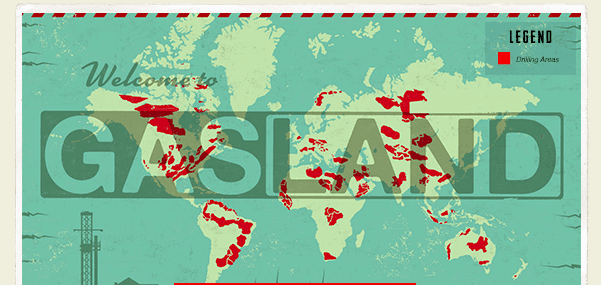Director and Producer Josh Fox came to the College of William and Mary Feb. 25 to screen his Oscar-nominated film “Gasland,” a documentary about hydraulic fracturing, also known as fracking, which is the process of injecting liquid at high pressures into shale beds; this fractures the rock and frees the oil trapped inside.
After receiving an offer from a natural gas company to frack in his upstate New York backyard, Fox decided to investigate this issue further. He traveled around the country and interviewed people who had been directly affected by hydraulic fracturing.
Fox talked to homeowners around the country who are turning on their faucets to flammable water, and have become so sick they cannot function properly.
“Movies like this are really important because they have such a broad audience who can start to care about these issues as they see the looks on people’s faces when they are telling you stories about how they had to leave and how they can’t drink their water anymore,” Alma Mater Productions Sustainability and Diversity Committee Chair Alexandra Rosenbluth ’15 said.
In the film, Fox interviewed Dr. Theo Colborn, a distinguished chemist and founder of the Endocrine-Disruption Exchange. Colborn identified more than 596 chemicals in fracking fluids.
“The neurological effects are very insidious,” Colborn said. “At first you may just have headaches…but eventually you may feel what is called peripheral neuropathy and when you get to this stage you have irreversible brain damage.”
Fracking increases domestic oil production and creates jobs. It also poses major health risks, however
“When you have thousands of wells, accidents will happen,” Geology Department Chair Chuck Bailey said.
Bailey said that he is concerned with the environmental and public health risks associated with fracking. One fracking well requires between one million and seven million gallons of water mixed with various chemicalscan be leaked into groundwater either through improper casing of the drill. Oil companies, however, are exempt from the Safe Drinking Water Act and therefore do not need to report which chemicals they inject into fracking sites.
Dr. Tony Ingraffea, an award-winning senior engineering professor at Cornell, estimates that one in 20 fracking sites leak immediately, and 50 percent of sites leak within the first thirty years after implementation. When all sites are connected to the same water source, one person’s bad well could mean bad water for the entire community.
Bailey also said that he is concerned with the possibility of creating earthquakes.
“When we put fluids back into the earth like this, we have the ability to cause earthquakes,” Bailey said.
Currently, the quakes caused by hydraulic fracturing have been of a smaller size, typically staying below a magnitude 4 on the Richter scale, but Bailey does not negate the possibility of larger quakes.
To conclude the screening, Fox offered a warning to the audience.
“With hydraulic fracturing being hailed as a possible solution [around the world], I don’t think this story is going away anytime soon, and it is possible that Gasland might stretch a little further than my backyard into yours,” Fox said.
Northern Virginia faces the possibility of fracking as of November 2014, the U.S. Forest Service approved a “compromised” hydraulic fracturing plan that protects 90 percent of the George Washington National Forest in Virginia, but slates 177,000 acres for hydraulic fracturing. Approximately 3 million people in the Northern Virginia and Washington, D.C. areas rely on these forest streams for drinking water.
Fracking has also been occurring longer in the southwest part of the state, and now oil exploration is taking place elsewhere.
One of the possible sites, the Taylorsville Basin, is located less than 30 miles from Williamsburg.
At the end of the event, Fox played “The Star Spangled Banner” on his banjo and recited the words of songwriter and activist Pete Seeger.:
“If a bar song can become a national anthem, we are really just making up America as we go along, and anything can happen,” Fox said. “Write the next great chapter. Write the next great song. Tell us the next great piece of American history because it’s completely 100 percent up to you.”


The other side of the issue:
http://energyindepth.org/wp-content/uploads/2011/11/Debunking-Gasland.pdf
Other other side…..
http://www.desmogblog.com/‘energy-depth’-was-created-major-oil-and-gas-companies-according-industry-memo
Fracking in Taylorsville? OMG!!!